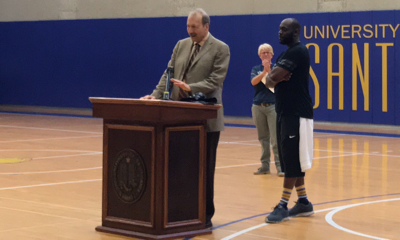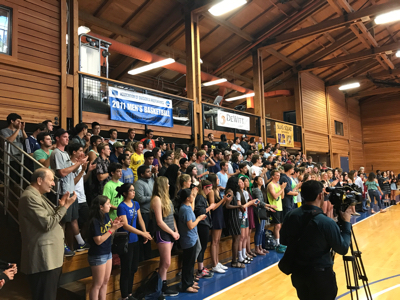Students overwhelmingly voted to put the UC Santa Cruz intercollegiate athletics program on a sustainable path forward.
Measure 68, which proposed a $38.50-per-quarter fee to support the NCAA athletics program and provide access to athletic-related activities to students who meet the Educational Opportunity Programs (EOP) criteria, passed with 79 percent of voting students supporting the fee. Thirty-nine percent of students voted on the measure.
“Intercollegiate athletics at UC Santa Cruz now have a bright future. I’m glad to see the program on a sustainable path forward—and to see that students recognize the value our intercollegiate programs bring to campus,” Chancellor George Blumenthal said. "I commend the campus community, the student athletes, EOP leadership, our alumni, and our foundation board members for all their hard work in supporting athletics."
The fee will provide the NCAA Division III program with approximately $1.1 million beginning in fall 2017. Approximately $160,000 will be generated to support athletic activities of student who meet EOP criteria, approximately 40 percent of the student body. The fee is scheduled to sunset is 2042.
“Developing this new business model required all of us to think differently about how to deliver a quality program that we can be proud of,” said Andrea Willer, executive director for the Office of Physical Education, Recreation, and Sports. “It required a campuswide conversation and support from many units on campus. I am thrilled that so many stakeholders were able to come together and work together for a positive outcome.”
The current NCAA program consists of 15 men and women’s teams, which have about 300 students on the rosters. The average GPA well exceeds the campus average and the program boasts a 100 percent academic retention rate for the past five years. The teams have gone on to compete in championships and students have received scholar-athlete honors.
Despite all the success on the field, the intercollegiate athletics program has been grappling with a deficit for the past several years, and campus leaders have asked that a sustainable funding model be developed that reduces the reliance on central campus funds. The program costs roughly $2.2 million with coach and trainer salaries (72 percent) and travel (16 percent) being the most significant expenses.
The new business model for intercollegiate athletics was developed in collaboration with students, faculty, staff, alumni, and campus supporters. The model proposes the new fee; anticipates an ongoing campus contribution of $500,000 per year; and anticipates growing revenue from licensing and fundraising.
“I strongly believe we have built an innovative business model for intercollegiate athletics that will allow the program to flourish for the foreseeable future,” said Paul Simpson, an alumnus who helped to develop the plan. “The Alumni Council was heavily vested in this process and I’m happy we were able to play a positive role on this outcome. There have been numerous councilors over the years that have advocated for the intercollegiate athletics program, and I hope they are proud that their advocacy has help lead us to this moment in time.
“It was an honor to represent this prestigious campus as an intercollegiate athlete, and I’m ecstatic that these current student athletes and future student athletes will have an opportunity to do the same.”
Two committees—one commissioned by the Academic Senate and one of alumni and foundation board members—extensively researched intercollegiate athletics and issued separate reports. Both committees, among many recommendations, asked that the campus consider every reasonable measure to keep the intercollegiate athletics program, which started in 1981.
Last year, UC Santa Cruz students showed strong support for the intercollegiate athletics’ program, with 63 percent of voting undergraduates signaling that they would be willing to establish a new fee.
“I’m very proud of our students,” Willer said. “Our student athletes have stayed committed to each other, to their teams, and to their campus. They were intricately involved in developing and executing the campaign and are 100 percent responsible for the overwhelming success of this measure. Go Slugs!”




